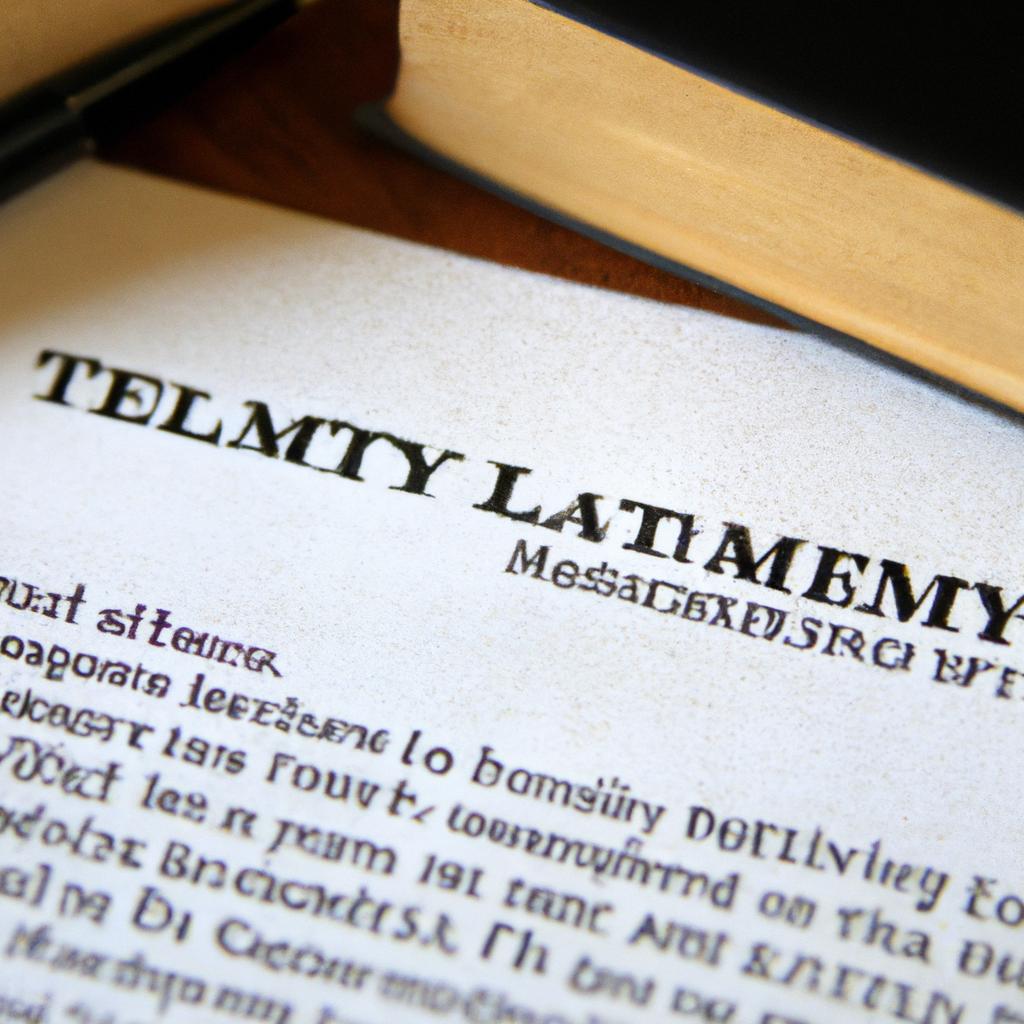In the intricate realm of estate planning and probate law, the issuance of letters of testamentary holds immense significance. As experienced legal professionals at Morgan Legal Group in New York City, we navigate the complexities of this crucial documentation with precision and expertise. Join us as we delve into the nuanced world of letters of testamentary, unraveling their meaning and importance in the administration of estates.
Understanding the Legal Implications of Letters of Testamentary
Letters of testamentary are legal documents issued by a probate court that grant authority to a named individual to act as the executor of a deceased person’s estate. These letters are crucial in the probate process and provide the executor with the legal standing to carry out their duties and responsibilities.
Understanding the legal implications of letters of testamentary is essential for executors to fulfill their obligations accurately and effectively. It is crucial to adhere to the guidelines and requirements outlined in these documents to avoid any potential legal issues or disputes during the probate process. Consulting with an experienced probate attorney can help clarify any questions or concerns related to the responsibilities associated with letters of testamentary.

Key Steps to Obtaining Letters of Testamentary in New York
Obtaining letters of testamentary in New York is a crucial step in the probate process, allowing the executor to act on behalf of the estate. To obtain these letters, there are several key steps that must be followed:
- Prepare Necessary Documents: Gather all relevant documents, including the original will, death certificate, and any other required paperwork.
- File Petition with the Surrogate’s Court: Submit a petition to the Surrogate’s Court in the county where the deceased resided, along with the required documents and fees.
- Attend Court Hearing: The court will review the petition and may require a hearing to verify the validity of the will and appoint the executor.
- Receive Letters of Testamentary: Once approved by the court, the executor will receive the official letters of testamentary, granting them the authority to manage the estate.
| Benefits of Letters of Testamentary: | Allows access to assets |
|---|---|
| Provides legal authority to act on behalf of the estate |

Navigating the Responsibilities and Powers Granted by Letters of Testamentary
When granted letters of testamentary, individuals are tasked with navigating a complex web of responsibilities and powers that come with the authority to administer an estate. In essence, letters of testamentary signify the executor’s official capacity to fulfill the wishes outlined in the deceased’s will. This legal document empowers the executor to handle various facets of estate settlement, including asset distribution, debt repayment, and ensuring the deceased’s final wishes are carried out.
Understanding the scope of duties and powers granted by letters of testamentary is crucial in effectively managing the probate process. Executors must adhere to legal guidelines, communicate with beneficiaries, manage estate assets, and navigate potential disputes that may arise during estate administration. With great power comes great responsibility, and it is essential for individuals holding letters of testamentary to seek legal counsel to ensure they fulfill their duties in compliance with the law.

Consulting with an Experienced Probate Attorney for Guidance on Letters of Testamentary
When it comes to navigating the complexities of the probate process and obtaining Letters of Testamentary, seeking guidance from an experienced probate attorney is crucial. Understanding the meaning and significance of Letters of Testamentary is essential in ensuring the proper administration of an estate.
Consulting with a knowledgeable probate attorney can provide the following benefits:
- Legal Expertise: An experienced attorney can offer legal advice and guidance tailored to your specific situation.
- Efficiency: Streamlining the probate process and avoiding unnecessary delays.
- Compliance: Ensuring compliance with state laws and regulations.
Q&A
Q: What are letters of testamentary and what do they signify?
A: Letters of testamentary are legal documents issued by a probate court that authorize an executor to act on behalf of a deceased person’s estate.
Q: How are letters of testamentary obtained?
A: In order to obtain letters of testamentary, the named executor of the deceased person’s will must file a petition with the probate court and provide evidence of their appointment in the will.
Q: What authority does an executor have with letters of testamentary?
A: With letters of testamentary, an executor has the authority to manage the deceased person’s assets, pay off debts, distribute property to beneficiaries, and handle other matters related to the estate.
Q: Are letters of testamentary required for every estate?
A: Letters of testamentary are typically required for estates that go through the probate process, which is necessary when a deceased person’s assets exceed a certain value or when there are disputes among beneficiaries.
Q: How long are letters of testamentary valid for?
A: Letters of testamentary are typically valid until the estate has been fully settled and all debts have been paid off, at which point the executor can be discharged from their duties by the probate court.
Insights and Conclusions
In conclusion, letters of testamentary are crucial legal documents that grant authority to an executor to handle the affairs of a deceased individual’s estate. Understanding the significance of these documents and the responsibilities they entail is essential for anyone involved in the estate administration process. By obtaining letters of testamentary, individuals can ensure that the wishes of the deceased are carried out in a timely and efficient manner. If you have any further questions about letters of testamentary, don’t hesitate to seek legal advice to navigate through the complex probate process.






